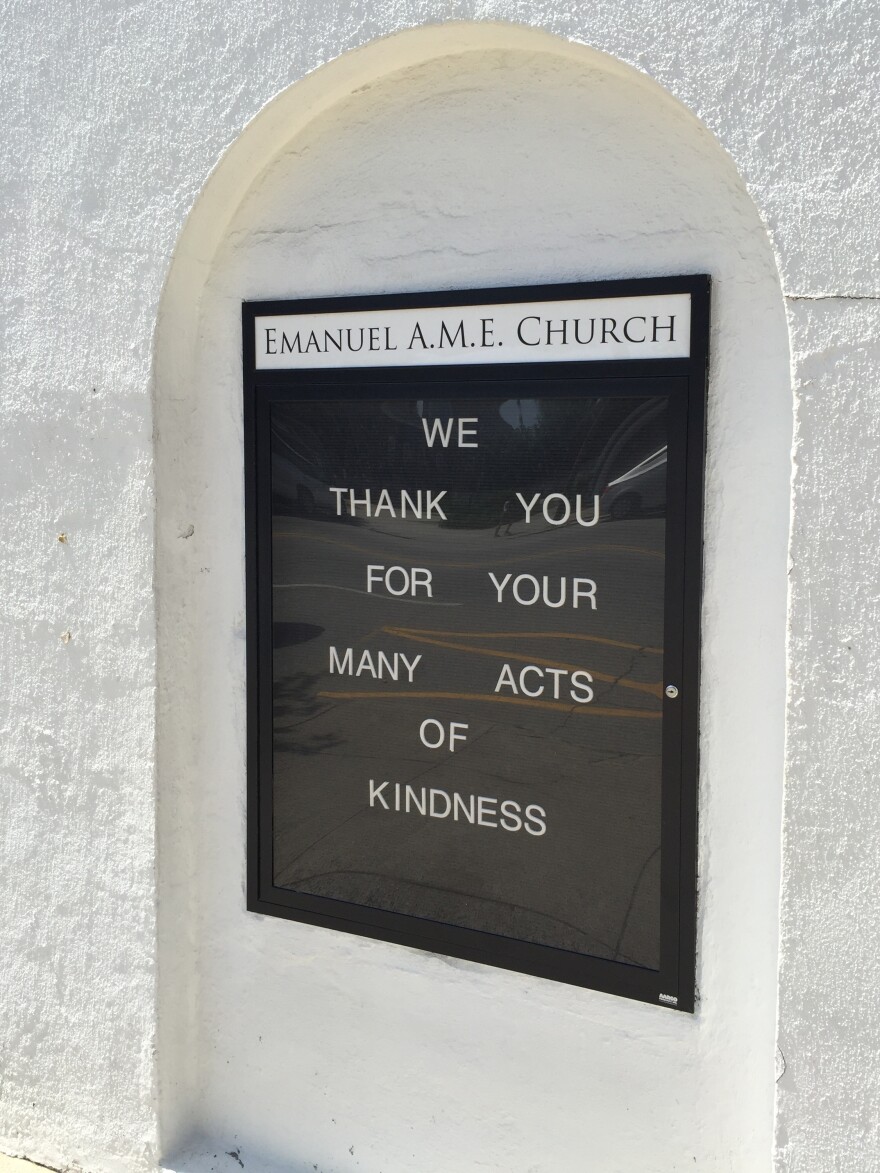It's been nearly a year since a mass shooting at a historic black church in Charleston, S.C., shocked the nation.
"We woke up today, and the heart and soul of South Carolina was broken," said Gov. Nikki Haley the morning after a gunman killed nine worshippers in what authorities describe as a race-based attack.
At the time, officials struggled to make sense of the crime that unfolded on June 17 during an intimate evening Bible study at Emanuel AME Church.
"This is a tragedy that no community should have to experience," said Charleston Police Chief Gregory Mullen at the first news conference late that night.
"It is senseless and it is unfathomable that somebody in today's society would walk into a church when people are having a prayer meeting and take their lives," he said.
Killed were Cynthia Hurd, Susie Jackson, Ethel Lance, Depayne Middleton, Tywanza Sanders, Daniel Simmons, Sharonda Coleman-Singleton, Myra Thompson, and Emanuel's pastor, the Rev. Clementa Pinckney, who was also a South Carolina state senator.
Polly Sheppard, Felicia Sanders (Tywanza's mother), and her 5-year old granddaughter survived the ordeal.
The pastor's wife, Jennifer Pinckney, and one of their young daughters were in the church but not in the Bible study, and heard the gunshots from another room. She declined NPR's request for an interview, but in an appearance at Duke University earlier this year, she spoke of how hard it's been since.
"There's not a day that goes by that I don't think about Clementa," she said. "There's not a day that goes by that our daughters, they don't think about their father."
She lives in Columbia, the state capital, and has started a foundation in her husband's name to carry on his social justice work. She says he was a peaceful person.
"Clementa invited a stranger in. He didn't see color," Pinckney said. "And even though this violent act happened, I think we all have to put God first."
'Nothing Is The Same'
Charleston is known as the Holy City. Church steeples dominate the skyline.

Emanuel African Methodist Episcopal Church started here in the early 1800s and is affectionately known as "Mother Emanuel" because it is the oldest AME church in the South.
"In Charleston, religion and churches represent identity," says the Rev. Kylon Middleton, pastor of Mount Zion AME Church, tucked in a leafy street just a few blocks from Emanuel.
"You attack my church, you attack me," he says.
From his pastor's study, Middleton describes the close ties between the two churches. Mount Zion is the daughter church of Mother Emanuel.
So it's personal. Even more so for Middleton. He grew up with the Rev. Pinckney, and the two were best friends — like brothers, he says.
"Everything has changed," he says. "Nothing is the same."
He calls the Emanuel mass shooting a "targeted terrorist attack" that shatters the myth of a postracial America.
"It has now opened the dialogue for larger well-meaning, thinking people to see that, wait, there are individuals who really systemically have a problem with black people by virtue of the fact that they're black," Middleton says.
'This Rubbed Things Raw'
It will be early next year before suspect Dylann Roof goes on trial for the Mother Emanuel killings. He faces the death penalty on nine state murder counts. The Justice Department is also seeking a death sentence on federal charges.
Officials say Roof had written a white supremacist manifesto online, talking about taking his fight to historic Charleston because of its significant black population. It included pictures of the blond young man holding a handgun and waving a Confederate battle flag.
Less than a month later, the South Carolina Legislature voted to remove that flag from the grounds of the Statehouse — something civil rights activists, including Clementa Pinckney, had sought for decades.
Standing in front of Mother Emanuel, the Rev. Joseph Darby with the Charleston NAACP says the massacre here was a defining moment.
"Because of what happened, Charleston will never be the same on many levels," Darby says. "And I don't think America will be the same. It put a horrid and raw face on American racism."
Darby believes the Emanuel shooting could be a catalyst for social change in much the way that the 1963 Birmingham church bombing was during the civil rights movement.

"South Carolina operates by what I like to call 'raging politeness.' We don't like to bring up anything that's touchy, that might be offensive," Darby says. "And the horrors that happened in Birmingham — the 16th Street [church] bombing, the police dogs, the whole Bull Connor thing — rubbed things raw so that folk had to deal with it. This rubbed things raw."
"It was a call to action," says Margaret Seidler, a fifth-generation Charlestonian.
She says it has opened eyes and hearts to more clearly understand the city's complicated racial history.
Since the attack, Seidler, a group facilitator, has been working with the police chief to foster a more open dialogue.
"We are going back and shining a light on our blind spots as human beings and growing together," Seidler says. "There's a lot of work to be done."
And the grieving continues.
Move The City Forward
"The massacre had a profound impact on our city and on our citizens," says Mayor John Tecklenburg.
Now he says the challenge is to move the city forward and address longstanding challenges rooted in racism and inequity.
"We don't want to just forgive and forget," Tecklenburg says. "We want to forgive and remember the things that are going to lead us to some positive change."
For the Rev. Kylon Middleton, the dialogue started by the tragedy in Charleston can be a lesson for the country.
"Put your gauntlet down and study war no more," he says. "Because something has to bring us together."
Copyright 2021 NPR. To see more, visit https://www.npr.org. 9(MDAxODc1NzUzMDEyMTgyMjc0NzUxZmVhMQ004))





